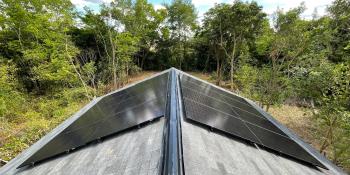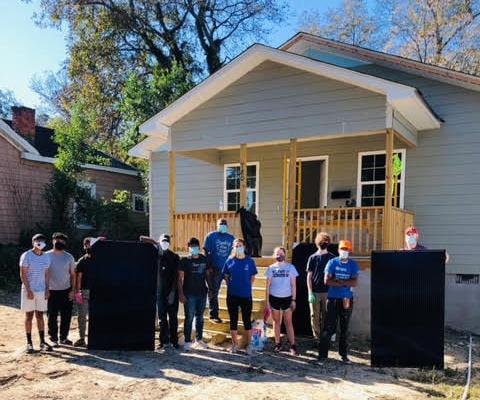
Engineering students help homeowners install solar
Moving to environmental sustainability begins with incremental steps. That’s the thinking behind the latest project from the 20-plus-year partnership between Macon Area Habitat and Mercer University.
Taking a step toward a greener future together, the affiliate and students from the university’s engineering department worked with six homeowners to design and install solar photovoltaic systems on the roofs of their Habitat homes.
Mercer students focused on creating small-scale, easily installed and easily maintained systems that tie directly from the power grid to the home — without the need for a costly or complicated battery. This way, after the homeowners are trained on the system, they are equipped to maintain, and even add to it on their own.
Roughly 40 students completed the installations, offering them meaningful, hands-on experience in their field. Several more Habitat technicians were also trained on the installation process, providing Macon Area Habitat the in-house expertise to bring this technology to other community projects.

“Most people think you have to hire a specialized engineering or construction company to install solar panels or that you have to buy enough panels to provide all the power to your home up front, both of which would be a big cost,” says Dr. Michael MacCarthy, associate professor of environmental and civil engineering and director of the Engineering for Development program at Mercer. “In reality, any general handyman or common electrician can be trained to install solar panels, and any amount of panels can be installed. Even a few panels providing a small amount of power to offset energy usage can still make a big impact.”
MacCarthy expects the systems will produce enough energy to cover 80-100% of each home’s daily needs. Any extra energy produced by the panels will be transferred back to the state’s shared energy grid, earning the homeowners’ money from the power company.
“This project really has a triple benefit,” says Ivey Hall, executive director of Macon Area Habitat. “Our homeowners get access to a technology that has not always been accessible, and they see the cost savings on their energy bills — savings that they can invest in other areas of their lives. The students get the opportunity to fully put what they’re learning in the classroom into practice in the community and have that direct contact with our homeowners, their neighbors. And then, of course, it’s an investment in the long-term health of our environment.”
“I love that the students — young people who are going to be leading the work of sustainability in the future — are connecting their concepts to real examples, real people who they will continue to build connections as they monitor the results together over the next year,” Hall continues. “I’m excited to think about how the students will take with this experience with them after graduation and into their careers, reminding them of the importance and impact of always working to make innovative ideas and solutions accessible to everybody.”
